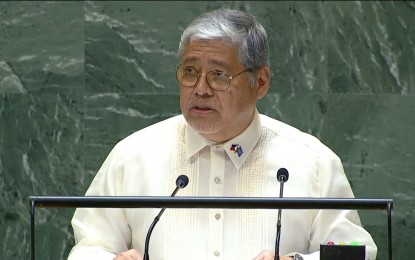
Foreign Affairs Secretary Enrique Manalo (Photo from DFA)
MANILA – The Philippines pushed for multilateralism in addressing disputes as it rejected narratives projecting the South China Sea (SCS) as a “theater of major power rivalry” during the annual United Nations (UN) high-level meeting.
Delivering the country’s message at the General Debate of the 79th Session of the UN General Assembly early Sunday (PH time), Foreign Affairs Secretary Enrique Manalo said multilateralism is underwritten by a rules-based order governed by international law and informed by the principles of equity and justice, that safeguards the rights of all states.
“If multilateralism is to thrive, all states must adhere to the rule of law,” he said.
Manalo said the International Court of Justice (ICJ) together with other international judicial and legal bodies, advances the rule of law, “uphold the primacy of resolving international disputes by peaceful means, not by the threat or use of force.”
“The growing volume and variety of cases brought before the ICJ and the Permanent Court of Arbitration signify the global trust and confidence in their role in peaceful dispute resolution,” the country’s top diplomat said.
“Member States must invest fully in these institutions,” he said. “The use of force and threat of use of force to resolve disputes has no place in our world.”
He said the country’s policy in the South China Sea dispute is anchored on the 1982 UN Convention on the Law of the Sea (UNCLOS) and the binding 2016 Arbitral Award on the South China Sea.
“The Award declares that claims exceeding entitlements beyond the limits of UNCLOS have no legal basis,” Manalo stressed.
The Philippines, “despite irresponsible and dangerous actions,” remains committed to diplomacy and other peaceful means to settle disputes, according to Manalo, adding that it will abide by the UN Charter and the Manila Declaration on the Peaceful Resolution of Disputes in asserting its sovereignty, sovereign rights and jurisdiction in the SCS.
“We do not accept narratives depicting the South China Sea as a theater of major power rivalry because they all ignore what is an essential truth: all states in this region have a right to determine their own destiny and secure their own future,” he stressed.
He cited that ASEAN and its centrality in the regional architecture exemplify the agency of states to bring forward multilateral solutions and shape the future of the region.
Reformed UN
Manalo also said that multilateralism must be reformed to address international crises and meet global development goals, echoing the overwhelming calls of nations to reinvigorate the UN agenda and processes following the adoption of a Pact for the Future, which resets the body’s focus as the international community deals with conflicts in Ukraine, Gaza, and Sudan, humanitarian catastrophes, climate change, persistent poverty, inequalities, disruptive technologies, and others.
Manalo highlighted that the Philippines, as a founding member of the UN, is actively engaged in working with other countries on global solutions on many fronts of multilateralism, citing that the UN remains “the only viable platform for collective action,” 79 years after its establishment.
He pledged the Philippines’ unwavering commitment to the international rules-based system, under the leadership of President Ferdinand R. Marcos Jr.
Manalo delivered the Philippine statement towards the end of the High-Level Week (HLW), which kicks off the 79th Session of the UN General Assembly (UNGA79).
At least 195 leaders, heads of state and governments, and foreign ministers spoke during the High-Level Debate.
Manalo headed the Philippine delegation to the UNGA79 HLW and other related meetings on Sept. 22 to 28.
He was joined by officials from the Department of Foreign Affairs, Department of Budget and Management led by Secretary Amenah Pangandaman, Department of Environment and Natural Resources, Department of Health, National Economic Development Authority and Climate Change Commission. (PNA)
